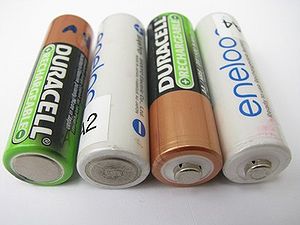Eneloop

Sanyo's Eneloops are low self-discharge (LSD) NiMH rechargeable batteries first introduced in 2005 (Sanyo is now part of Panasonic). They have a nominal capacity of 2000 mAh in the AA size and 800 mAh in AAA size. They seem to perform better than any other LSD cells (Eneloop Self-Discharge Study Eneloop vs. Rayovac Hybrid Eneloop vs. Imedion). While most LSD cells retain 75-80% of their charge after a year, Eneloops can retain 85%. They are very consistent in their performance, retain their original capacity better after many cycles, and deal well with high drain applications (like a flashlight on "turbo"). Therefore if you ask on the forums what kind of battery to buy, you will be told to buy Eneloops. That said, the other brands also perform well, just not quite as well as Eneloops. If money is an issue, try other brands of LSD cells, which can sometimes be purchased for as little as $1 each on a good sale.
In 2010 second generation Eneloops began showing up promising 1,500 charging cycles vs. 1,000 cycles for the earlier versions [1]. The packaging clearly indicates that the new batteries can be charged 1,500 times and the batteries themselves feature a crown graphic on the label. The product number ends with "A" (e.g. HR-3UTGA).
In November 2011 Sanyo started production of third generation Eneloops promising 1,800 charging cycles. The standard third generation cells have metallic lettering and the product number ends with "B" (e.g. HR-3UTGB). [2]
Duraloop
The term "duraloop" (a CPF nickname, not an official name) refers to Duracell precharged cells that are made in Japan and are white around the positive button just like Eneloops, and in fact are thought to be Eneloops re-badged as Duracells. Other Duracell precharged cells have a black top and are made in China, and are not called "duraloop."
Other Varieties
The Eneloop brand has diversified into light blue Eneloop Lite cells with less capacity (950 mAh for AA cells and 550 mAh for AAA) and supposedly less cost, designed for use in low-drain devices like remotes. Sanyo claims these lighter weight versions of Eneloops can be recharged 2,000 times. Introduced in June 2010[3].
In late 2010, Sanyo introduced black Sanyo XX cells using Eneloop technology (higher capacity than Eneloops at 2500 mAh for AA, but not as low self-discharge: more like 75% after a year and said to be good for 500 cycles). These were marketed primarily in Europe. In 2011, these batteries were renamed Eneloop Pro but keep the black wrapper[4].
The Eneloop Plus was introduced at the same time as the Eneloop Pro. The Plus has a thermistor that monitors temperature of the battery and will cut off power in case of a dead short or if batteries are inserted incorrectly.
In 2010 Sanyo introduced limited edition Eneloop Tones which are standard 1,500 cycle Eneloops that come in an 8-pack of different colors[5]. Green and blue Tones showed up in some charger combos in the US. In 2010 sparkling Tones were advertised to be released in November[6]. In November 2011, "eneloop tones chocolat" were announced in 8 earthtone or chocolate colors. There are two Disney special edition third generation Eneloop packages introduced in January 2012.
Many of these Eneloop offshoots are available only in Japan.
Additional Information
Overview of all Eneloop batteries post on BLF by user ChibiM
References
- ↑ SANYO announces the release of the upgraded AA- and AAA-size eneloop, Sanyo press release, May 6, 2010
- ↑ Third Generation Eneloop product announcement October 6, 2011
- ↑ Eneloop Lite product announcement March 8, 2010
- ↑ Eneloop Pro and Plus product announcement June 9, 2011
- ↑ Eneloop Tones Press Release April 22, 2010
- ↑ Eneloop Glitter produce announcement October 25, 2010